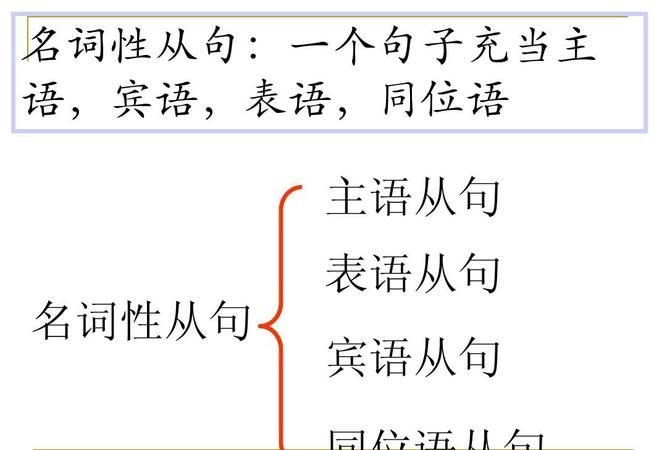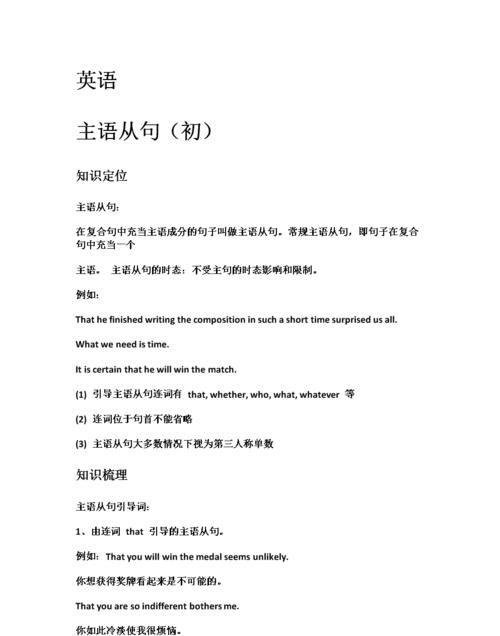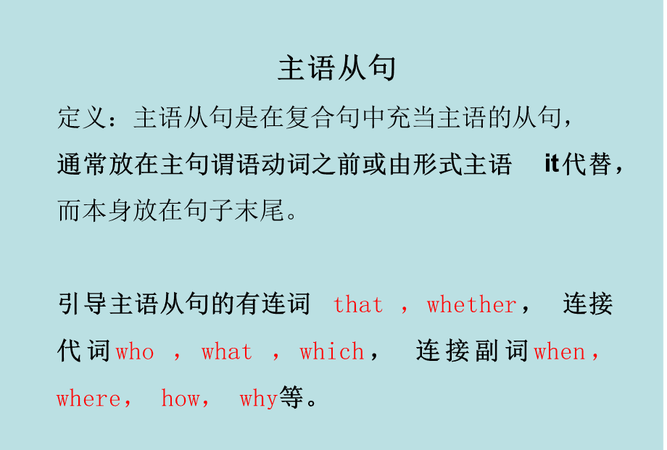本文目录
什么是主语从句
1)主语从句可直接位于主语的位置,如果从句较长,谓语又较短,可用it作形式主语,而将从句放在句末。常见的句型有: *It is a fact\a pity\a question\good news that... *It seems\appears\happened\has turned out that... *It is clear\important\likely\possible that... *It is said\reported\estimated\has been proved that... It is said that comic books create a connection between people of the same generation. It seems that the performance is very useful. 2)what引导的主语从句表示“...的东西时”。 What we lack is experience. 3)what,who,when,why,whether等词含有各自的疑问意义,但它们引导的主语从句,都用陈述语序。 How the plan is to be carried out should be discussed again. I did know why I felt like crying.

whether引导的主语从句可以位于句首吗
whether引导的主语从句,可以放在句首、主语的位置。
但是,在实际应用中,常常用it作为形式主语,把主语从句后置。在疑问句、感叹句中,只能用it作先行词的结构。
希望我能帮助你解疑释惑。

主语从句的四种句式
1、由连词that引导的主语从句。
例如:That you will win the medal seems unlikely.
你想获得奖牌看起来是不可能的。
That you are so indifferent bothers me.
你如此冷淡使我很烦恼。
That she survived the accident is a miracle.
她在事故中幸免于难简直是奇迹。
2、用连接代词或连接副词if, whether 引导的主语从句。
例如: Which of them escaped from the prison is still a mystery.
他们哪一个是从监狱里逃跑的,仍然是个谜。
When they will come hasn’t been made pubic.
他们什么时候来还不知道。
Whether she is coming or not doesn’t matter too much.
她来不来都无关紧要。
3、用关系代词引导的主语从句。
例如:What you need is more practice.
你所需要的是更多的训练。
What I want to know is this. 我想知道的就是这事。
Whatever we do is to serve the people.
我们无论做什么都是为人民服务。
4、主语从句可以直接放在主语位置上,也可以用it作形式主语,而将从句放在句末(尤其是当谓语较短时)。
例如:That light travels in straight lines is known to all.

扩展资料
主语从句,即在复杂句中充当主语成分的句子,例如"That he finished writing the composition in such a short time surprised us all",他在很短的时间内写完作文让我们都很惊讶,此复合句主要描述的是某事让我们惊讶,某事就是该复合句的主语,因此“That he finished writing the composition in such a short time”便是该复合句的主语从句。
引导主语从句的连词主要有:
从属连词:that whether
连接代词:who whoever whom whose what whatever which whichever
连接副词:when where how why
小结:
(1)引导主语从句连词有that,whether,who,what,whatever等
(2)连词位于句首不能省略
(3)主语从句大多数情况下视为第三人称单数,但也有例外,如例(9)
注意:当what引导的名词性分句作主语时,主谓一致问题极为复杂。
参考资料:百度百科——主语从句
什么是主语从句
一、概述:在句子中起名词作用的各种从句统称为名词性从句。根据它们在句中的语法作用,这类从句又可分为主语从句、同位语从句、表语从句和宾语从句。
二、 几个共性问题:
1.连接方式
(1) 在由连词that, whether, if引导的名词性从句中,引导词在句中不做成分,在宾语从句和表语从句中,that可以省略。
(2) 在由连接代词who, whose, whom, which, what, whoever, whomever, whichever, whatever引导的名词性从句中,其连接代词在句中起名词性作用,担当一定成分。
(3)在由连接副词when, where, why, how引导的名词性从句中,其连接副词在句中作状语。
2.whether和if的区别
(1)whether在引导的主语从句中可以置于句首,而if则不能。
(2)whether可以与or not连用,or not可以紧跟在whether之后,也可以置于从句末尾;if一般不能和or not连用。
(3)表语从句、同位语从句和介词宾语从句(即在系词be和介词之后),只能用whether连接,而不用if。
(4)从句是否定式时,一般用if, whether很少用在否定式从句中。
例如:I don’t care if he doesn’t come . 如果他不来,我也不介意。
The problem is whether we can carry out the plan.
问题是我们是否能实施这项计划。
三、 主语从句
1.主语从句主要有三类:
(1) 由连词that引导的主语从句。
例如:That you will win the medal seems unlikely.
你想获得奖牌看起来是不可能的。
That you are so indifferent bothers me.
你如此冷淡使我很烦恼。
That she survived the accident is a miracle.
她在事故中幸免于难简直是奇迹。
(2) 用连接代词或连接副词if, whether 引导的主语从句。
例如: Which of them escaped from the prison is still a mystery.
他们哪一个是从监狱里逃跑的,仍然是个谜。
When they will come hasn’t been made pubic.
他们什么时候来还不知道。
Whether she is coming or not doesn’t matter too much.
她来不来都无关紧要。
(3) 用关系代词引导的主语从句。
例如:What you need is more practice.
你所需要的是更多的训练。
What I want to know is this. 我想知道的就是这事。
Whatever we do is to serve the people.
我们无论做什么都是为人民服务。
主语从句可以直接放在主语位置上,也可以用it作形式主语,
而将从句放在句末(尤其是当谓语较短时)。
例如:That light travels in straight lines is known to all.
光沿直线传播,这是众所周知的事。
=It is known to all that light travels in straight lines.
众所周知光沿直线传播。
When the plane is to take off has not been announced .
飞机何时起飞还没有宣布。
= It has not been announced when the plane is to take off.
还没有宣布飞机何时起飞。
当what引导的主语从句表示“…的东西”时,一般不用it作形式主语。
错:It is a book what he wants.
对:What he wants is a book. 他想要的是本书。
如果带主语从句的句子是疑问式,则必须用it作形式主语的结构。
例如:Has it been settled who will be sent to carry out the task ?
谁将被派去执行这项任务决定了吗 ?
3.固定用法和译法
(1) It is +名词+从句
It is a fact that… 事实是……
It is good news that … ……是好消息
It is a question that … ……是个问题
It is common knowledge that … ……是常识
类似的名词还有:a pity;a wonder;a good thing; no wonder; surprise等。
例如:It is a mystery to me how it all happened.
这一切是怎么发生的是个谜。
It is common knowledge that the whale is not a fish.
鲸鱼不是鱼,这是常识。
It is no surprise that Bob should have won the game.
鲍勃会赢得这场比赛,这不足为奇。
(2) It is +形容词+从句
It is necessary that … 有必要……
It is clear that … 很清楚……
It is likely that … 很可能……
It is important that … 重要的是……
类似的形容词还有:strange; natural; obvious; true; good; wonderful; possible; unlikely; quite; unusual; certain; evident; worth-while; surprising; interesting; astonishing, etc.
例如:It is obvious that conductors and insulators are both important in industry.
很明显导体和绝缘体在工业中都很重要。
It is doubtful whether she will be able to come.
她是否能来令人怀疑。
It was really astonishing that he refused to talk to you .
他拒绝和你说话真是令人惊讶。
It is essential that he should be here by the weekend .
周末之前,他应该到这里是必要的。
It seems obvious that we can not go on like this.
很明显我们不能这样下去了。
(3) It is +过去分词+从句
It is said that … 据说……
It is reported that … 据报道……
It has been proved that … 已证明……
It must be proved that… 必须指出……
类似的过去分词还有:known; estimated; expected; believed; thought; hoped; noted; discussed; required; decided; suggested; demanded; made clear; found out,etc.
例如:It is thought that he is the best player.
大家都认为他是最好的选手。
It is estimated that the vase is 2000 years old.
据估计这个花瓶有2000年的历史。
It is used to be thought that a new star must be due to a collision between two stars. 过去一直认为新星是由于两颗星星之间碰撞产生的。
It has not been made clear when the new road is to be opened to traffic.
还没弄清楚这条路将开始通车。
(4) It +不及物动词+从句
It seems that … 好像是……
It happened that… 碰巧……
It follows that … 由此可见……
It has turned out that … 结果是……
类似的不及物动词还有:seem, appear, occur, follow, happen, turn out, etc.
例如:It turned out that nobody remembered the address.
结果是无人记得那个地址。
It now appears that they are in urgent need of help.
看起来他们急需帮助。
It does not matter if I missed my train, because there is another later.
没有赶上这趟火车没有关系,稍晚还有一趟。
It happened that I saw him yesterday.
碰巧我昨天看见他了。
当“及物动词 + 宾语”较短时,也可用这种结构。
例如:It shocked me that Peter did not tell anybody where he was.
让我吃惊的是彼得没有告诉任何人他在哪里。
It does not interest me whether you go or not.
我对你去不去不感兴趣。
It +某些固定结构+ 主语从句。
例如:It doesn’t make too much difference (It doesn’t make any difference / It doesn’t alter the situation),whether it rains or not . 下不下雨都没有多大关系。
It does not make any difference whether it rains or not .
下不下雨没什么分别。
It does not make the least difference to me what you do.
对我来说你做什么都无关紧要。
Is it of much consequence to you that Mr. Wang has failed to do it ? 王先生没有做成这件事对你有什么重要影响吗

以上就是关于主语从句位于什么位置 ,什么是主语从句的全部内容,以及主语从句位于什么位置 的相关内容,希望能够帮到您。

